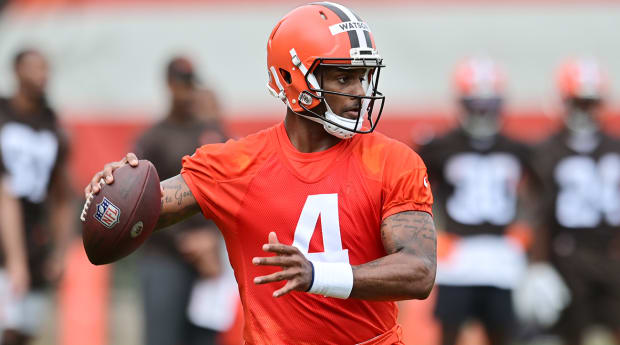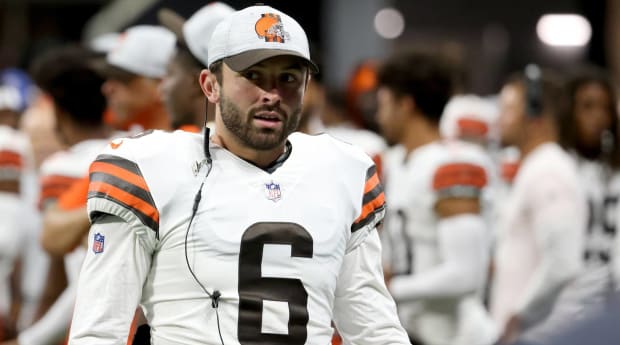Tuesday was the most significant day on the Deshaun Watson front since he was traded from the Texans to the Browns in March.
During late morning, Texas attorney Tony Buzbee, the representative for the 24 plaintiffs who sued Watson over the last 15 months alleging instances of sexual harassment and sexual assault, announced that settlements had been reached in 20 of 24 cases. In doing so, Buzbee signaled a big step toward closure—one that was almost taken before the trade deadline last fall, and one that should simplify the task in front of the NFL and the appointed arbitrator, ex–U.S. District Judge Sue Robinson.
That, to be clear, isn’t any sort of statement about the innocence or guilt of Watson. It also isn’t any sort of statement on the seriousness of the accusations (that’s been established).
But it does matter.
So to reset the landscape in the Watson case, rather than answer the slew of mailbag questions on it I received Tuesday, we figured it’d be smart to give you an FAQ overview on where things stand from all angles.

Ken Blaze/USA TODAY Sports
HOW DOES THE PROCESS WORK?
It started with NFL senior vice president Lisa Friel—who served as the chief of the sex crimes unit in the Manhattan District Attorney’s office—conducting her investigation. Once her investigation was complete, she reviewed her findings with the NFL, NFLPA and representatives for Watson. (I was told that Friel spoke to at least half the plaintiffs when the number of lawsuits was still 22, and she also spoke with women involved who didn’t file suit).
The next step for the NFL and the NFLPA is to make their recommendations based on the evidence Friel gathered. From there, the case goes to Robinson, who reviews it and can hold a hearing if she sees fit. After that, she makes her ruling. If she finds there was no violation, the case is over, and there isn’t a punishment.
If she finds a violation, she would then recommend a punishment to commissioner Roger Goodell or his designee (in this case, it’s not yet clear whether Goodell or a designee will be making the final judgment). Goodell or his designee would then make a ruling, with the league and union having a chance to appeal that decision before a final decision is made.
WHERE DOES THE PROCESS STAND RIGHT NOW?
The case is in Robinson’s hands, and the league has already recommended serious discipline. The union, arguing Watson’s side, has cited the lack of punishment in cases involving Commanders owner Dan Snyder, Patriots owner Robert Kraft and ex-Panthers owner Jerry Richardson as reasons for Watson’s punishment to be lighter.
My understanding is the league wants Robinson to consider a full-season suspension.
WHAT ARE THE PRECEDENTS IN THIS CASE?
The Ben Roethlisberger case is probably closest in that the ex-Steelers quarterback was accused of, but not charged with, sexual assault. Roethlisberger was the first player suspended by Goodell under the personal-conduct policy without being charged with a crime—his suspension was for six games to start the 2010 season and was knocked down to four games after Roethlisberger met conditions for the reduction.
The Ray Rice case set the tone for other domestic violence cases moving forward. The NFL suspended Rice for two games in July 2014 after he was accused of assaulting his fiancé. The league was criticized for going light on Rice that summer with a two-game suspension. Then, in September, the day after the first Sunday of the ’14 season, the elevator video of Rice assaulting his fiancé emerged. The Ravens cut him that week, the league put him on the commissioner’s exempt list (which had been used sparsely before that), and Rice never played in the NFL again.
Since Rice’s case, the league has mostly taken a stronger stance with violence against women. In 2017, Cowboys running back Ezekiel Elliott was suspended for six games after the NFL spent more than a year investigating domestic violence allegations raised by Elliott’s former girlfriend in Columbus, Ohio. She filed police reports and went to the Columbus City Attorney’s Office to pursue charges in July ‘16, but Elliott was never charged with a crime.
WHAT ARE THE IMPORTANT DATES AHEAD?
My understanding is that one thing holding up the process was anticipation of the June 30 deadline for pretrial discovery. The league, and Robinson, would naturally want to have as much information as possible before making a decision, and letting that deadline pass would at least give those involved more peace of mind that new developments—while still possible—would be less likely.
I’d think that deadline becomes less relevant now with just four lawsuits active.
The next checkpoint in the calendar would be the late-July opening of training camp. The Browns open camp July 30, but the league doesn’t have to make a decision by then. However, the league has treated the start of camp as an unofficial celebration of the return of football in recent years. As such, it makes sense the ever-PR-conscious NFL would want to have the Watson case closed (at least for now), though that’s not completely in the league’s control (Robinson has some say).
IS IT POSSIBLE WATSON IS BANNED FROM TRAINING CAMP?
History tells us that’ll happen only if it’s a yearlong suspension. In every other offseason suspension I can remember levied, including Roethlisberger’s—be it for personal conduct, PEDs, recreational drugs, whatever—the player would take part in camp, with the suspension taking effect at the outset of Week 1. So if Watson is suspended for six, eight, 10 or 12 games, he’d likely be allowed to participate in camp and be banned from the team beginning on Labor Day.
IS THE COMMISSIONER’S EXEMPT LIST STILL IN PLAY?
Per the rules, it could be—Goodell has vast latitude to put a player on paid leave. That said, if he did so in this case, he’d be going back on his word. He maintained in March at the league’s annual meeting that, since there were no criminal charges, he wouldn’t be using the exempt list, and that Watson would either be suspended or not punished.

Gary Vasquez/USA TODAY Sports
There was some thought that Goodell may reverse course more recently in light of a New York Times report by Jenny Vrentas that Watson booked massage therapy sessions with 66 women over the span of 17 months, and the emergence of 23rd and 24th plaintiffs. But my guess here is that the resolution of 20 of the 24 cases makes that less likely. More likely, in my opinion, would be a suspension with the league allowing for punishment to be altered down the line if new information warrants it.
WILL THIS AFFECT THE BROWNS’ POSITION ON BAKER MAYFIELD?
I can’t see Mayfield willingly returning to the Browns and being a good soldier (even if, at this point, that might be his best career move). And the team hasn’t been holding on to Mayfield as an insurance policy—he’s still in Cleveland because there hasn’t been a team willing to take on his $18.8 million guarantee for 2022. If the Browns were toying with keeping him around, they wouldn’t have already offered to take on a significant portion of that money, as I’m told they have, to facilitate a trade.

Jason Getz/USA Today network
So for however long Watson is out, Jacoby Brissett is likely to be the quarterback for the Browns.
IF THE REMAINING FOUR LAWSUITS AREN’T SETTLED, THEN WHAT?
The cases likely continue into 2023. It’s unlikely they’ll be heard in July, and the sides have already agreed to a moratorium on the lawsuits going to court that’ll run from Aug. 1 to March 1. Which means there’s a decent chance this goes on a while longer.
WHAT FINANCIAL REPERCUSSIONS IS WATSON FACING?
Watson made $10 million last year with the Texans while on paid leave. His new contract with the Browns makes it so a suspension in 2022 would be relatively light, with his base salary for this year just $1.035 million. So if he is suspended, he would lose $57,500 per game. He already has been paid a $44.965 million signing bonus. The league could also fine him on top of a suspension.
If a second suspension happens in 2023—should new information come out in court then—this could look different, with his base salary for that season sitting at $46 million.







